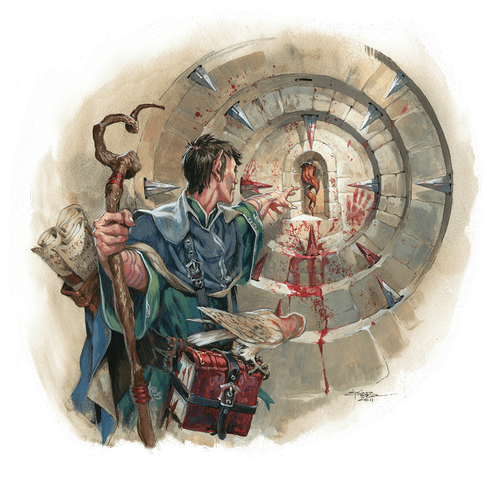D&D 5e: Read Mind and Influence People With The Telepathy Feat

D&D 5e: Read Mind and Influence People With The Telepathy Feat
SOURCE: Tasha’s Cauldron of Everything
Rating the Benefits of Telepathic
Benefit #1 –
Increase Intelligence, Wisdom or Charisma by 1, up to a maximum of 20
Boost any of the primary spellcasting stats by 1, while still gaining the benefits of the rest of this feat
Benefit #2 –
You can speak telepathically to any creature within 60ft. They can’t respond unless they also have a similar ability, and this doesn’t allow creatures who wouldn’t otherwise understand you to know what you’re saying
At will telepathy is useful. Adding so many limits onto such a simple ability really isn’t. Unfortunately, there are so many constraints placed on this that what might be a good bonus becomes much less effective
Benefit #3 –
Cast Detect Thoughts once per day. You can recast the spell using spell slots, if you have them. The free cast also has no verbal or somatic components
Detect Thoughts is a situational, but incredibly effective spell. A free cast once per day might be all you need, and the fact you can cast this without obviously flapping your arms around lets you read minds without ever being detected. This is by far the best part of the Telepathic feat.

Mechanics and Requirements
Understanding How It Functions
The Telepathic Feat’s Mental Communication
One of the main benefits of the Telepathic feat is the ability to communicate with creatures via telepathy.
The ability allows a character with this feat to speak directly into the mind of any creature within 60ft of themselves, allowing for clandestine communication.
At least, supposedly.
The problem is that the ability comes with a ton of what seem to be mostly arbitrary restrictions:
- You can talk to creatures telepathically, but they can’t talk back
- You can only communicate in a language you know, so you can’t use this to speak to people you wouldn’t normally be able to talk to
- It doesn’t allow for special awareness in the creature being spoken to, so you can’t talk to, for example, animals using this.
- You can only communicate with targets you can see. Suddenly in the dark? Whoops, your brain voices don’t talk anymore.
All in all, the telepathy granted by this feat is mediocre and far too limited to see common use. It’s especially galling as there are a bunch of similar abilities, all of which are better. A non-exhaustive list includes:
- The Aberrant Mind Sorcerer can link their mind to another character essentially forever, with a range measured in miles, and the target can talk back. This is possibly the best early-level telepathy in the game.
- The Great Old One Warlock gains telepathy for a creature that speaks any language at level 1
- The Soulknife Rogue can link a number of creatures up to their proficiency bonus with telepathic communication, with a range of up to a mile
- The Awakened Mind Warlock Invocation is essentially the same as this feat, with a 30ft range
- Ghostwise Halflings and Gem Dragonborn have a 30ft telepathy range that’s equivalent to this as a racial trait
So, that said, the telepathy granted by the Telepathic feat is a little bit of a disappointment. Unless you’re playing a campaign that relies on hidden communication and subterfuge, this is likely to be an ability that’s only used for flavor and fun around the table.
Reading Minds For Fun and Profit: Detect Thoughts
The second benefit of the Telepathy feat is the ability to forcibly read the minds of those who oppose you, by casting Detect Thoughts.
Detect Thoughts is a level 2 spell that’s generally only available to Arcane casters, the Bard, Sorcerer, and Wizard.
When cast, for up to a minute, or as long as concentration holds, you can focus on a creature within 30ft. When you do, you learn the surface thoughts of that creature; what it’s thinking about at that moment.
There’s no save against this part of the spell, and it also specifies that questions naturally shape the direction of a creature’s thoughts, so Detect Thoughts is great for interrogation.
You might also choose to probe deeper, which requires a Wisdom Save, but lets you dig deeper into that creature’s mind. Though, at this point, they will know that you’re reading it, so it’s best to save this for your enemies.
All of this is already good, but Detect Thoughts also has a potential scouting and combat use. While the spell is up, you can use it to detect the thoughts of any creature with an Intelligence greater than 3 within range.
This functions like a radar, pinging any creature in that radius, unless their presence is blocked off by barriers. The ability punches clean through most things; it’s stopped by 2 feet of stone, 2 inches of metal, or a sheet of lead. Your standard door provides no protection. Neither would anything in a town or village. That means, yes, you can use this spell to scout straight through walls and doors and detect what’s on the other side.
You won’t pick up animals, because their intelligence is too low. But sentient creatures are completely fair game.
The spell can be cast once for free, and characters with spell slots can recast it as normal. This is especially good for characters who wouldn’t have access to this. Druids, Clerics, and Paladins in particular love the ability to read minds, keying from their own casting stat.
Key Stats
The Telepathic feat allows a character to boost one of either Intelligence, Wisdom or Charisma by 1, to a maximum of 20. This is a great spread, covering every main spellcasting stat in D&D 5e.
For the purposes of this feat, the Detect Thoughts spell also uses the statistic you choose to increase for its save DCs.
Ideal Characters for Telepathic
Top Classes
Druid – The Druid doesn’t get Detect Thoughts and has great spellcasting and high Wisdom for Insight. That’s already good synergy with the Telepathy feat.
What pushes this up to a genuinely good feat for the Druid is the fact that you can use your telepathy while in Wild Shape. Yeah, the target still can’t talk back, but any communication is better than staring at things and hoping you make sense. This also opens up some interesting angles, like turning into something small and inconsequential, a rat or a bird for example, then spying and sneaking around while still being able to chat to your friends.
Rogue – Potentially the stealthiest character in the game, any Rogue not taking the Soulknife subclass (which has a lot of overlap with this feat) will generally appreciate a way to speak to their allies as they sneak through the shadows.
Atop this, most Rogues are the face of the party, taking up a lot of the skill load, and expected to deal with many of the social encounters. Telepathy and the literal ability to read people’s minds can massively help with that.
Ranger – Surprisingly, Rangers really appreciate everything this feat offers; A stat bonus in Wisdom is perfect for the Ranger, and telepathic speech is significantly more useful on a character that’s designed for stealth and solo ranging.
There’s even a lot of utility in Detect Thoughts. The Ranger doesn’t naturally gain access to the spell, has high Wisdom, so happens to be great at Insight to further tell when people are lying, and, again, is probably going to be away from the party at times, so can easily make use of the secondary, mind-detecting part of the spell.
Race or Subrace Choices
Variant Human – One of the times when the Telepathic feat is genuinely good is Variant Human and taking it at level 1. The stats are nice, the telepathy is the fun flavor for a lot of classes, and Detect Thoughts as soon as the game starts is amazing.
Changeling – The ability to shift your appearance, plus useful skill proficiencies in things like Persuasion and Deception, are incredibly effective spying tactics when paired with the ability to read minds.
Combos, Tactics, and Synergies
Complementary Feats
Magic Initiate – Specifically for Find Familiar. More on this in the guide below.
Other Magical Feats – If you’re investing into extra spell power, generally as a martial class that has limited access to magic, more feats that grant spells are a good option.
Telekinetic – Why not take the pair of mental feats? Telekinetic is far more combat focused and evens out the stat boost gained by this feat.
Spells that Synergize
Invisibility – The ability to silently communicate to your party is a massive boon when you’re literally invisible. It’s just another vector that your enemies won’t be able to use to find you.
Telepathy – This feat’s big brother. Once you can cast level 8 spells, this extends your communication range to the entire plane you’re on, and they can actually talk back this time! Yay!
Strategies for Maximizing Telepathic Effectiveness
Interesting Ways To Use Telepathic Speech
There are many interesting uses for single-direction telepathic speech through the general adventuring day. Example uses might include;
- When scouting – It’s all well and good sneaking ahead and finding a group of goblins, but how are you supposed to let your party know the specifics, like how many there are and what they’re doing, without giving yourself away? Beaming the answers directly into your friend’s face, that’s how.
- In social situations – Examples might include realizing someone is lying with your high Insight skill, then letting the rest of the party know without directly accusing out loud.
- As a prelude to a fight- The Rogue telling the party “Enough with the diplomacy, I’m going to draw my knife and lunge” makes it much less surprising for the party when that happens.
- As an ambush reaction – For example, a hidden character letting the rest of the party know when it’s time to burst out of the bushes and charge
Importantly, you can target any creature within range. This opens up a whole bunch of weird, interesting uses. Note that your GM might nix any of these, depending on how permissive they are.
- Whisper in the ear of a guard on duty, until they think they’re going mad and go back to the guardhouse for a sit down and a coffee
- Shout at, or insult, an enemy during combat to potentially distract them
- Bother animals with your psychic whispers. They won’t be able to understand you, but spooky speech is surely going to have some effect on a dog or a horse
Familiars and Telepathic Chaining
One of the most interesting uses for telepathic communication is with your familiar and the party. Many classes can grab a familiar, either through spellcasting or through class features.
A character can already communicate telepathically with their familiar when it’s within 100ft. With the telepathic feat, the character can also speak to their party, as long as they’re within 60ft.
This pushes a safe scouting bubble out from the party. Stealthy characters, Rogues with Expertise in the skill, or Wizards who’ve turned themselves invisible, for example, can let their familiar range ahead, lurking behind it, while the party hangs back even further.
The familiar talks to the character, and then the character hands that information on to the rest of the party. Safe, easy, secure.
Just note that you can’t talk to your party when looking through your familiar’s senses, as this blinds the character, and you have to see the target of your telepathy.
The Intricacies of Detect Thoughts
Detect Thoughts isn’t an Enchantment spell, it’s Divination. This matters a lot, because many creatures have advantage on spells against Enchantments, but Divination resistance is much more rare.
You can use the wide-ranging detection abilities of Detect Thoughts to locate enemies in combat. Examples might include invisible enemies, or if you become blinded and have to rely on other means of identification.
Enemies below Intelligence 3 are flatly immune to the spell. This covers most beasts and other simple-minded creatures but also covers a surprisingly large variety of things like many undead.
Anything that has a higher Intelligence is also immune, if it somehow doesn’t speak any languages. This is quite rare but does still come up occasionally.
Final Thoughts on Telepathic
Let’s not belabor the point. The Telepathic feat isn’t very good. The innate telepathy granted by the feat is worse than almost every other way to gain telepathic speech in 5e. It’s worse than what many characters will have as a racial perk. +1 to a stat is always fine, I guess.
That means you’re essentially spending half a feat on Detect Thoughts, plus Subtle Spell on it and a free cast once per day. In certain campaigns focused heavily on social encounters and stealth, this will be genuinely amazing. But then, you’re going to know that you’re playing that sort of game pretty quickly.
In most other situations, Telepathic is objectively worse than taking any other spellcasting feat, or just playing one of the many classes and races that offer parts of what this offers. It’s too limited to build around and too situational to be this limited, and that’s just a shame because the theme and flavor are just too cool.








